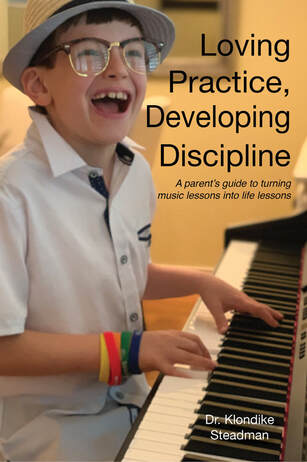 [from Loving Practice, Developing Discipline] 9 Things Great Teachers Do 1. Respect the Student Good teachers respect their students, getting to know each as an individual and putting the child’s development into a joyful, skilled musician and happy human being above all else. 2. Possess Extensive Expertise Effective music instruction requires having a clear understanding of every aspect of musical excellence, from technique, to style, to musicianship, to theory. Teachers must be able to articulate this understanding in ways appropriate to the age and ability of each of their students. A good teacher need not be the best musician in the world, but he needs to be skilled enough to discern what constitutes excellence in his students. 3. Assess Students Accurately It’s important for music teachers to be skilled at assessing their students’ technical, musical, emotional, and motivational needs. In order to make progress, the teacher must “begin where the student is.” If the teacher misjudges the student’s ability, she will be unable to design an appropriate course of study. 4. Work from an Effective Sequence of Materials Appropriate to the Student There are many books available for learning each instrument, and none of them are perfect for any child. All of them (including those I have written myself) must, at the very least, be supplemented to meet the needs of the child. Many methods, unfortunately, are seriously flawed in some way: Either the progression of skills is too fast or too slow, the material is uninteresting, the technique is damaging to physical development, or some other serious problem. A good teacher must overcome the flaws of the method book. 5. Give Effective Feedback to the Student This means providing feedback that is appropriate, well-timed, delivered in a manner to which the student is receptive, and, above all, results in improvement in the student’s playing. This is exceptionally difficult because one is never quite sure what words or tasks will magically create a breakthrough for the student. A great deal of experience and good intuition are the best guides, but even then, it is easy to fall short. 6. Teach the Child to Learn on Her Own A good teacher will assist the child in transferring the skills she has learned to new contexts so that she may begin to learn on her own. All great teachers wish to “teach themselves out of a job.” If the teacher approaches each lesson by showing the student where to put her fingers to play this or that song, it is unlikely that the student will eventually be able to figure out new songs on her own. If, on the other hand, the teacher provides the student with the tools for learning, helps her to feel empowered to learn new things on her own, and gives her opportunities to practice learning on her own, then the student may one day surpass the teacher. Of course, an even higher level of transference is to help the child to understand how she achieved excellence in music and transfer those learning skills to other areas of her life. 7. Provide Motivating and Appropriate Performance Experiences Without the motivation that comes from playing in groups, recognition at talent shows, performing on recitals, and other opportunities to shine, even the most dedicated student is likely to lose interest. 8. Build Well-Rounded Skills The famed composer and music educator Zoltán Kodály said, “The characteristics of a good musician are a well-trained ear, a well-trained mind, a well-trained heart, and a well-trained hand. All four parts must develop together in constant equilibrium” (197). This doesn’t refer to a teacher who talks about developing these skills, but a teacher who actually provides activities, experiences, and challenges developing the student’s hand, heart, mind, and ear in ways that the student can relate to and even love. Students with well-rounded skills are vastly more likely to continue to make music as adults because they can fit into a variety of different musical contexts. Whether it be jamming with their colleagues after work in a rock band, joining the local civic orchestra, or playing Christmas carols at the family holiday party, they will have the skill set to participate confidently in whatever musical endeavors may arise. 9. Make a Positive Difference In the end, this is all that matters. Most teachers will use the above skills to make a difference, but if a teacher can make a positive change in the student some other way, or with some incredible strength in one of the above areas, but a complete absence of the others, then I say, “More power to you.” The Right Teacher (Not the Perfect Teacher) As you can see, this is a daunting list, and it doesn’t even contain a few logistical necessities such as “show up on time,” “maintain a clean, well-lit studio,” “communicate with the parent,” and “stay in business long enough to make a difference.” The odds that you will find a teacher who is truly excellent in every area are slim to none...Teaching is hard. If it weren’t so rewarding, I think I would go find an easier profession. Maybe alligator wrestling. So, if finding the perfect teacher is impossible, what does it mean to find the “right teacher?” The right teacher is someone who effectively works with your family to create a positive learning experience for your child. This will be different for each child and each family. 1. Be honest and clear in your assessment of your child’s needs and willingness to grow. A good teacher will work with these needs, but also help you understand how you can build systems and learn techniques for making music-learning enjoyable for the whole family. 2. Seek the advice of trained musicians who are also parents. Many parents love their child’s teacher despite the fact that their child may be learning next to nothing. In my experience, most parents like teachers who praise their child and create a loving environment. These are good, but insufficient aspects of teaching. On the other hand, professional musicians are often equally poor judges of excellent teaching. Just because someone is the lead guitarist for your favorite local band or the concertmaster of the symphony does not mean she understands the first thing about how to create an effective learning environment. Musical parents whose children have had successful musical training will often be aware of which teachers are both nurturing and effective. 3. Insist on a trial lesson or trial period, not just a conversation. Observing your child in the context of the lesson is really the only way to judge if this particular teacher will be a good fit for your family. The teacher may come highly recommended, have terrific results with other children, and be the most nurturing person on the planet, but none of that guarantees he will hit it off with your child. 4. Look for a teacher who will provide clear, written goals both for the week and the year. She should base these goals on the best interests of the child, but also the family situation. For example, a teacher should be interested in the parents’ work schedules, the family’s travel plans, and so forth, anything that might affect practice time. Of course, it is up to the parent to inform the teacher of these situations. 5. Above all, trust your instincts. A music teacher is often the longest-term mentor a child has. A child will get a new classroom teacher each year (and undoubtedly some of those will be amazing, powerful, and influential), but hopefully she will have the opportunity to work with her music teacher for many years. The teacher need not be perfect, but he should be a source of positive development for your child in as many ways as possible. Comments are closed.
|
|
Music Education Programs
|
Visit Our NW Austin Music School
|
Visit Our Cedar Park Music School
|
|
© Copyright 2022 Orpheus Academy of Music.
|
Website by Never Alone Business Services
|



